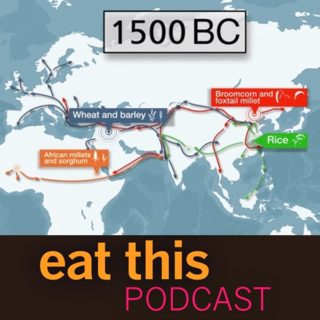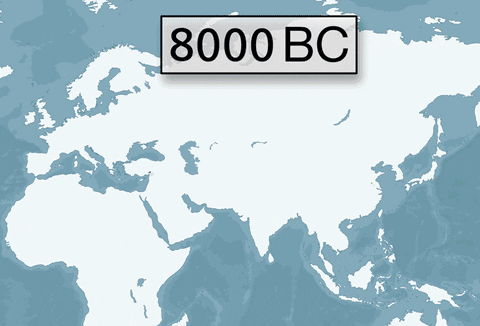Podcast: Play in new window | Download (Duration: 20:58 — 16.9MB)
Subscribe: Google Podcasts | Spotify | Android | RSS | More
 For a while, archaeologists treated the origins of agriculture – where it began, how it spread – as a minor element in the grand sweep of human history. That started to change with new techniques that could identify preserved plant remains, especially cereal seeds, in the detritus of archaeological digs. Then came the ability to tell what people had been eating by looking at the chemicals in their bones. And every day new discoveries in genetics add yet more details.
For a while, archaeologists treated the origins of agriculture – where it began, how it spread – as a minor element in the grand sweep of human history. That started to change with new techniques that could identify preserved plant remains, especially cereal seeds, in the detritus of archaeological digs. Then came the ability to tell what people had been eating by looking at the chemicals in their bones. And every day new discoveries in genetics add yet more details.
Martin Jones, Pitt Rivers professor of Archaeology at the University of Cambridge, has spent his entire working life studying the archaeology of crops. With some colleagues, he has now published a paper that offers a more detailed, and more nuanced story of agriculture. Crops were moving much further much earlier, and as they did so early farmers grew the confidence, the resources and the knowledge to move up into the mountains and down into the river basins. Far from being a minor element in archaeology, the journeys of the first farmers and their crops established the routes along which the rest of human development travelled.

Notes
- The paper, From ecological opportunism to multi-cropping: Mapping food globalisation in prehistory, is behind a paywall, but there is a very good press release.
- That press release is also the source of the animation, which illustrates how four of the ancient world’s most important domesticated grain crops spread across the Old World between 7,000 and 3,500 years ago, by Javier Ventura, Washington University.
- The banner photograph I built from Tilling Rice, after Lou Shou, a scroll in the Freer/Sackler Museum. OK, so it’s late 13th century, long after the period we are talking about, but there isn’t any contemporaneous imagery as far as I’m aware and in any case it is charming. Go look.


Beautiful piece, thanks. And the location of those millet noodles reflects perfectly on Martin Jones’ ideas on prehistoric globalisation
Beautiful piece, thanks. And the location of those millet noodles reflects perfectly on Martin Jones’ ideas on prehistoric globalisation
Jeremy’s latest newsletter includes this nice write-up of a recent paper on the origins of Chinese food, under the title I’ve stolen above.
Here’s the rest of the newsletter.
Did you actually click on that really cool GIF from Jeffrey Ross-Ibarra and Dolores Piperno illustrating the movement of maize that we linked to in Brainfood on Monday? No?
You’re really missing out…
Somebody do Panicum miliaceum now.
No, wait, we have that too.
Prehistoric food globalisation eatthispodcast.com/prehistoric-gl…
@olivesandbread That’s on my list, although I have also heard criticism.
Love the map
Can’t wait to listen! I’m just finishing James C. Scott’s book, Against the Grain, which is about the formation of ancient city-states near alluvial plains, and the essential connections to grain agriculture.
The mango whisperer.
Conserving the Khola chilli.
Going back to Fiji for this fundraising meeting next week. Follow along on Twitter.
Are we on the Titanic?
Vintage cookbooks galore. If we’re going down, might as well go down in style.
Jeremy’s podcast on cereal cultivation’s 3-step program for spreading around Eurasia.
Latest episode takes a look at the deep history of food globalisation.
eatthispodcast.com/prehistoric-gl…
Latest episode takes a look at the deep history of food globalisation.
eatthispodcast.com/prehistoric-gl…
Latest episode takes a look at the deep history of food globalisation.
eatthispodcast.com/prehistoric-gl…
Nice podcast on the Eurasian history of cereals eatthispodcast.com/prehistoric-gl… https://t.co/MiYxX3P1QE
Jeremy has an interview with Martin Jones on the latest Eat This Podcast. Dr Jones, Pitt Rivers professor of Archaeology at the University of Cambridge, was an author of the paper on the prehistoric globalization of cereals that we blogged about here a couple of weeks back. Well worth a listen.
from eatthispodcast.com/prehistoric-gl…
Prehistoric food globalisation eatthispodcast.com/prehistoric-gl… And see also agro.biodiver.se/2019/02/8000-y…